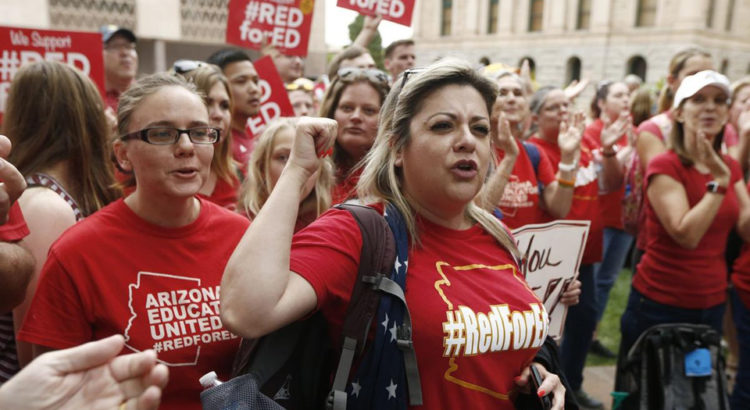Por: peoplesworld.org/08-05-2018
The weeklong strike by Arizona teachers ended in a pretty handsome victory for teachers and supporters. They won a 19 percent salary increase over three years which is quite something for hard working teachers grown accustomed to tiny raises, if any, that never kept up with the cost of living.
Yet some are criticizing the educators for ending the strike before winning every one of their demands. They are not understanding how important was the victory that the teachers and their allies actually did win.
To understand the magnitude of the victory it’s important to look at what educators are up against. You may have noticed that when teachers strike, which isn’t often, they usually walk out in the fall when classes begin. First days of school in the fall get more attention, when teachers, students, and staff are knuckling down for the school year. Teachers’ unions have had time to prepare for job actions over the summer and everybody is more energetic.
This latest wave of teacher strikes, however, took place late in the school year precisely because it wasn’t a narrowly planned action. Arizona teachers reacted spontaneously, inspired by teachers’ strikes in West Virginia, Oklahoma, and other states. The main organizers formed a loose online organization called Arizona Educators United which grew like a prairie fire. It was joined by the two teachers’ unions, parents, students, school boards, the labor movement, and the public at large. It was a lesson about the need to be creative and always look for new ways to advance the struggle.
In Tucson on May Day, thousands celebrated International Workers’ Day with a massive rally and march down to the State Building in solidarity with the striking educators. With strong support from the Pima Area Labor Federation, teachers, and community supporters and all wearing red in solidarity it looked like a real May Day. To many it was a lesson about the workers’ holiday, labor history and the importance of international solidarity.
The large concessions won by teachers and the promised infusion of more money into schools is a huge reversal from years of neglect and severe cuts in school funding. The Arizona Republicans, who control the legislature and all statewide offices, haven’t merely cut and slashed education. They have been out to destroy public education.
Since public schools are such a basic part of American democratic tradition they couldn’t just abolish the schools outright without a public outcry. Instead they have been weakening public education by supporting private school vouchers, and contracting out education through use of charter schools. They figured if they damaged schools enough the public might eventually agree to replacing the schools with state subsidized private and charter schools. Their main weapon has been large tax cuts to the rich, draining funds from education and that was another lesson learned. When they ended the strike teachers began a petition campaign for a ballot initiative to tax the rich to fund future education. Hundreds of thousands learned who the enemy of education is and where the funding must be found.
I worked for a decade in Arizona schools and was an active member of the American Federation of Teachers. Our union local’s president was a Reagan Republican, and many of the school employees were quite conservative with no experience or knowledge of trade unionism. In my school most were not union members.
The strike movement has changed that. Now teachers have learned the importance of organization and unity, and the need to fight back if they want to save public education. It was another lesson learned, one about the importance of allying with parents, students, and their communities for a broader front against the right wing.
Most importantly, Arizonans learned that small struggles by local unions for small concessions, while important, are not enough. They learned that working people need to get political and take on the corporate class and their right-wing puppets in the streets, in the legislature and governor’s mansion. Yes, it’s important to win concessions, even small ones, but they will take them back unless we organize and strengthen our peoples’ coalitions. It’s important to defeat the ultra-right in the November elections. These struggles are where working people learn about class struggle and, hopefully, where they will eventually learn about the need to abolish capitalism once and for all.
So aside from winning some good economic concessions our teachers and the public also gained a class struggle education which, together with the new organizational forms, will strengthen us for the battles ahead. We have nothing to lose but our chains.
*Fuente: https://www.peoplesworld.org/article/lessons-learned-from-the-arizona-teachers-strike/








 Users Today : 28
Users Today : 28 Total Users : 35459934
Total Users : 35459934 Views Today : 33
Views Today : 33 Total views : 3418498
Total views : 3418498